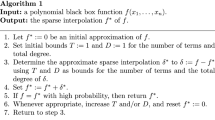Summary
Four problems are considered: 1) from an n-precision integer compute its residues modulo n single precision primes; 2) from an n-degree polynomial compute its values at n points; 3) from n residues compute the unique n-precision integer congruent to the residues; 4) from n points compute the unique interpolating polynomial through those points. If M (n) is the time for n-precision integer multiplication, then the time for problems 1 and 2 is shown to be M (n) log n and for problems 3 and 4 to be M (n) (log n) 2. Moreover it is shown that each of the four algorithms are really all instances of the same general algorithm. Finally it is shown how preconditioning or a change of domain will reduce the time for problems 3 and 4 to M (n) (log n).
Similar content being viewed by others
References
Borodin, A., Munro, I.: Evaluation polynomials at many points. Information Processing Letters 1, 66–68 (1971)
Brown, W. S.: On Euclid's algorithm and the computation of polynomial gratest common divisors. J. ACM 18, 478–504 (1971)
Fiduccia, C.: Polynomial evaluation via the division algorithm: The fast fourier transform revisited. Proceeding of the 4th Annual ACM Symposium on Theory of Computing, Denver (Col.) May 1972, pp. 88–93
Heindel, L., Horowitz, E.: On decreasing the computing time for modular arithmetic. Proceedings of the 12th Symposium on Switching and Automata Theory, Oct. 1971, pp. 126–128
Horowitz, E.: A fast method for interpolation using preconditioning. Information Processing Letters 1, 157–163 (1972)
Horowitz, E.: The efficient calculation of powers of polynomials. J. Computer and System Sciences 7, 469–481 (1973)
Knuth, D. E.: The art of computer programming, Vol. 2. 2nd edition. Reading (Mass.): Addison-Wesley 1971
Kung, H. T.: Fast evaluation and interpolation. Computer Science Technical Report, Carnegie-Mellon University, Jan. 1973
Moenck, R., Borodin, A.: Fast modular transform via division. Proceedings of the 13th Symposium on Switching and Automata Theory, IEEE Computer Society, Oct. 1972, pp. 90–96
Schönhage, A.: Fast computation of continued fraction expansions. English translation of: “Schnelle Berechnung von Kettenbruchentwicklungen”. Acta Informatica 1, 139–144 (1971)
Sieveking, M.: An algorithm for division of power series. Computing 10, 153–156 (1972)
Aho, A., Hopcroft, J., Ullman, J.: Analysis of algorithms. Book in preparation
Author information
Authors and Affiliations
Additional information
This research was supported by the National Science Foundation under grant GJ-33169.
Rights and permissions
About this article
Cite this article
Horowitz, E. A unified view of the complexity of evaluation and interpolation. Acta Informatica 3, 123–133 (1974). https://doi.org/10.1007/BF00264033
Received:
Issue Date:
DOI: https://doi.org/10.1007/BF00264033




